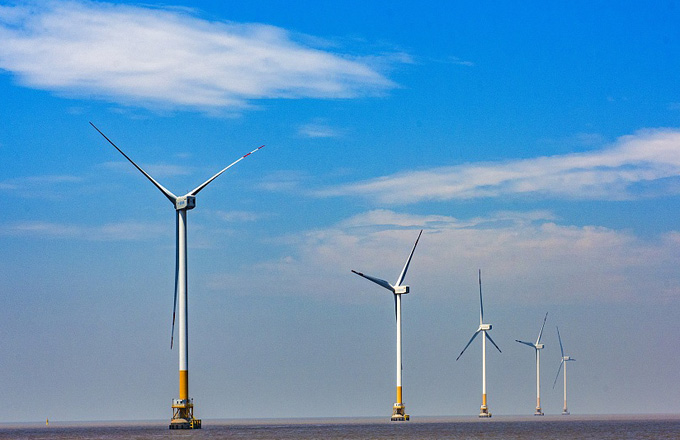Building power ties, brick by brick
Robust energy industry-related relations among BRICS countries — Brazil, Russia, India, China and South Africa — complement producers and exporters on one side and importers and suppliers on the other, creating a perfect atmosphere for win-win deals that could bridge the demand-supply gap among the bloc members, analysts said.
For example, Russia and Brazil are oil exporters and producers, while India, China and South Africa are net importers.
Russia is looking to export its oil to importers outside the European Union. Emerging economies like China are seeking to import oil for energy security. China is willing to seize opportunities arising from Russia’s needs, they said.
So, energy deals between such countries could help make BRICS stronger, said Li Li, energy research director at ICIS China, a consulting company that provides analysis of China’s energy market.
China and Russia have already forged a variety of oil and gas ventures and undertaken investments in recent years.
These include the Yamal LNG project located in the Arctic region of Russia, the world's first integrated project for polar natural gas exploration, development, liquefaction and transportation.
In many ways, Yamal signifies future possibilities in the key energy industry for BRICS countries.
The project is expected to begin operations this year and much of Yamal's output will be supplied to China and other Asian countries, according to Novatek, the natural gas producer in Russia responsible for the Yamal project.
China is already the world's largest energy consumer, producer and net importer. Its total oil imports in the first six months of this year reached 212 million tons, according to the General Administration of Customs.
China has always regarded Russia a priority partner for cooperation in investments, Li said.
"China has been a top buyer and strategic partner of Russia's abundant oil and gas resources, and the country's financial support from institutions, including the China Development Bank, also helped deepen bilateral cooperation."
Yamal is not the only bright spot.
Gazprom, Russia's largest natural gas producer, has a 30-year deal with China National Petroleum Co under which Russia will start supplying gas to China through Siberia at the end of 2019.
Dubbed the "Power of Siberia", the new pipeline, part of a China-Russia supplementary purchase and sale contract, has a planned annual capacity of 38 billion cubic meters, Gazprom said.
According to Wang Jun, general manager of the Russian unit of China Petroleum & Chemical Corp, or Sinopec, the world's largest refiner, Russia has abundant energy resources, and Chinese oil and gas companies' are providing necessary technology for exploration and development, which makes the two countries a perfect match for energy cooperation.
Russia, with its political stability and low risk to resources, should be taken as a key strategic region for Chinese companies, he said.
According to Li, in addition to Russia, China has been actively nailing various energy cooperation agreements with other BRICS members, providing support in infrastructure construction, technology and export of capital goods.
In South Africa, for example, Sinopec announced in March that it will pay some $1 billion for a 75 percent stake in Chevron Corp's South African assets, like its subsidiary in Botswana, in an attempt to secure its first major refinery on the African continent.
The acquisition is believed to take further advantage of the energy behemoth's downstream experiences to turn the site on the African continent into a more profitable storage terminal.
Demand for refined petroleum in South Africa has been increasing at an average annual rate of nearly 5 percent over the past five years, thanks to a growing middle class. Such demand is currently estimated to be around 27 million metric tons, Sinopec said.
"Sinopec used to focus mostly on the domestic market, but now it has been expanding abroad, with its ample expertise and experience, interfacing more with the global market," Li said.
"China's oil and gas companies have been more active in chasing refinery assets worldwide in recent years, in an attempt to further reshape their asset portfolios while exporting their technologies."
This is also consistent with the country's Belt and Road Initiative, taking China's new refinery technology and management experience abroad and better strengthening the country's connectivity with the world, she said.
State Grid Corp of China, with its abundant expertise and experience, also has big plans to play a key role in the clean energy industry in South America.
The company, which runs the majority of the nation's electricity distribution networks, had landed ultra high-voltage electricity transmission projects in Brazil.
According to Li Lequan, deputy director of State Grid International Development Co Ltd, SGCC's subsidiary for global operations, the ultra high-voltage electricity transmission projects in Brazil mark a major breakthrough in China's "going global" strategy in the field of UHV technology.
Han Xiaoping, an analyst at Beijing-based cnenergy.org, said the technology makes it possible to transmit large amounts of power over long distances.
Given Brazil's vast and varied geography, this is exactly what the country needs, he said.
Han said the UHV line will signify Brazil's, as well as South America's, first "electricity superhighway".
"State Grid's UHV technology will also make the company a global leader in the power plant, as well as the distribution grid construction market," he said.
Zhou Dadi, a senior researcher at the China Energy Research Society, said China's advanced technology in power transmission, power transformation, nuclear energy and renewable energy can help countries, including India, to develop low-carbon energy alternatives.
Zhou said there is immense potential for energy cooperation among the five BRICS countries. They should maximize such potential, he said.
He also cautioned that thorough research of other countries' economic situation, foreign investment policy and state of the domestic energy industry is needed to ensure win-win cooperation.



















